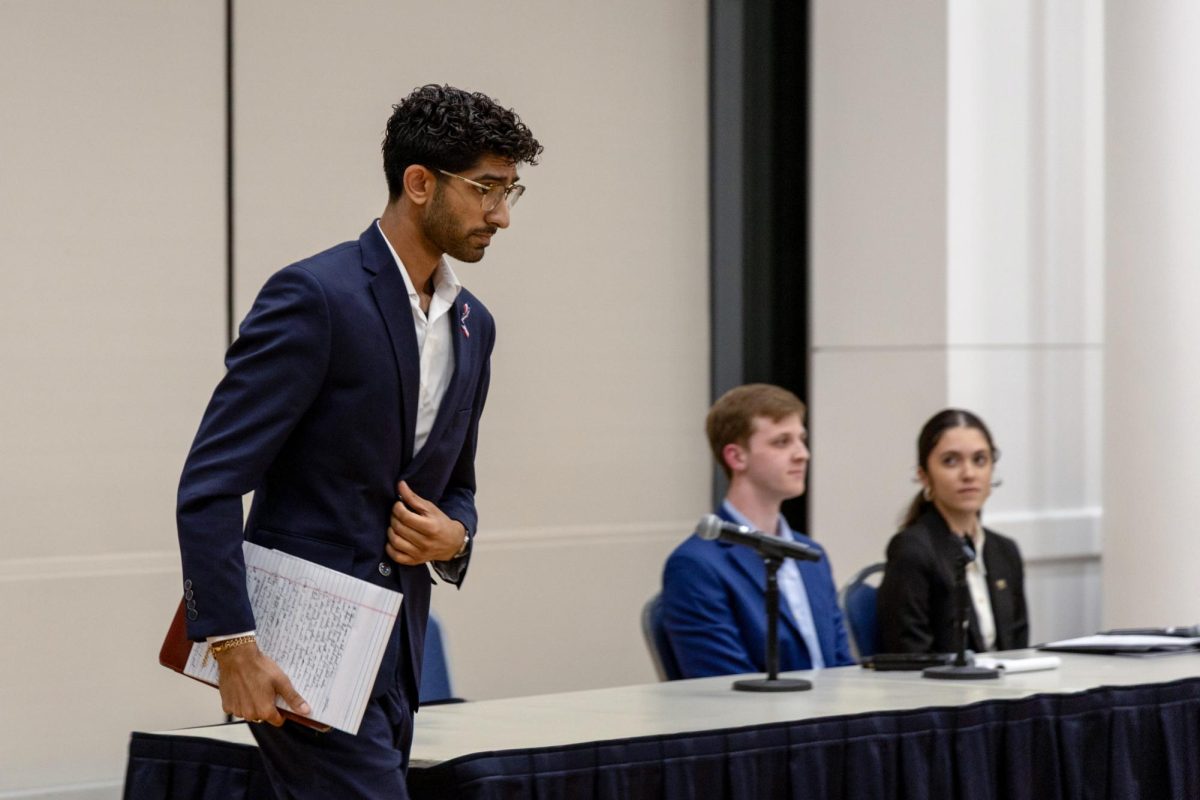Students will soon have a new avenue to seek guidance on academic integrity and disciplinary violations.
Student Association leaders released an application Thursday for students to apply to the Student Advocacy Corps, a group of student mentors who will be trained to help their peers with a disciplinary issue navigate the student code of conduct. Students can currently solicit advice on disciplinary issues from parents, friends or employees in the Office of Student Rights and Responsibilities, but SA leaders said student advocates can help students feel more comfortable talking through their options with a peer who is well-versed in the code.
“We wanted to create a standardized adviser for the student, a student who could be their peer and come talk to them about their issue,” Samantha Paralikas, the SA’s vice president for judicial and legislative affairs, said. “They would be able to give them an unbiased third-party view of what their options are.”
The code was overhauled last month for the first time in more than 20 years.
Students selected for the corps will undergo about three months of training from SA leaders and officials through the beginning of next semester. During training, student advocates will learn about the academic code of conduct, the way GW’s disciplinary process works, cultural bias and will practice how to work with students during hearings and office hours, Paralikas said.
The group will officially start its operations in March, she said.
The advocates will help students with an academic or disciplinary issue ask questions or take notes during a hearing. They will not act as defenders during the hearing, but instead as guides to help students understand how they can navigate their violation, she said.
Currently, the code allows students an adviser, which could be a parent, friend or person outside the University, to accompany them in hearings about violations like plagiarism or alcohol in a residence hall. Students can also request case workers in the Office of Student Rights and Responsibilities to answer any questions students have about the code or their violation.
But Paralikas said other advisers, like a parent or friend, may not be entirely knowledgeable about the code and would not be able to give proper advice on what questions to ask during a hearing. Case workers can also be “intimidating” for students to use because that person is working in the office that filed their violation, she said.
“Sometimes to that student, that could appear like this is a biased opinion because this is the SRR office, which is technically putting this violation on you,” Paralikas said. “But they’re also telling you what your options are, so it seems a little contradictory.”
Eventually, Paralikas said members of the corps will train new student advocates so the group is entirely self-operated under the purview of the SA.
In its first year, the corps will be comprised of five to eight students, but that number could increase or decrease depending on the volume of students using student advocates’ office hours or attending hearings, Paralikas said. SA leaders will accept applications for students to apply to the corps until Nov. 15, and the student advocates will be selected by SA leaders by the end of the semester after going through an interview process, she said.
SA leaders will also appoint one student to oversee the corps’ day-to-day operations as the director of the corps, which will become a member of the SA’s executive cabinet, Paralikas said.
Christy Anthony, the director of the Office of Student Rights and Responsibilities, said she was “excited” about the idea for the group when SA leaders first approached her over the summer because she has seen iterations of successful student-led groups at other universities.
She said the Office of Student Rights and Responsibilities will aid SA leaders in the group’s planning process and train students who are selected to serve on the corps.
“We are looking forward to working with the Student Association as they look to launch a student advocacy corps, which will be student-led and developed,” she said in an email.
Hannah Bloom, a senior policy adviser in the SA who spearheaded the project as the former vice president for judicial and legislative affairs last academic year, said the idea for the group is based on prior conversations with former SA leaders who passed down research down to Bloom to start a corps.
Schools like Georgetown and American universities have a similar framework to the corps, where students can receive free and confidential advising from student advocates. After researching the corps at other universities, “it was only natural that we would eventually develop something similar and get it off the ground,” Bloom said.
Bloom said when students are selected to serve in the group, they will also receive a training guidebook, which was drafted over the summer by her and Paralikas. The book will include information about the “standards” of their position, like confidentiality, office hour requirements and GW Police Department policies.
“I don’t think people really talk about disciplinary stuff when it happens, and I know a lot of people just pay the fine and move on with their lives or they go to class and take it without realizing that you can contest charges,” Bloom said. “Sometimes the charges they give you are not as bad as they could be.”
SA President Ashley Le said officials and student leaders will promote the application to join the corps through announcements at the annual Diversity Summit Thursday and Friday, email blasts and SRR listening sessions that officials have hosted to garner feedback on the code.
Le said that once the corps officially takes off in March, case workers in SRR can also advise students with an academic or disciplinary issue to seek a student advocate in the SA, she said. Student advocates will also have a physical space to operate, but the location has not yet been decided, she said.
She said students will also select an international student advocate to help international students understand cultural differences in issues like academic honesty, where plagiarism violations might be understood differently outside the United States. Eventually, SA leaders will add additional advocates specific to different demographics of students, she said.
“It’s difficult to be able to navigate when they’re having an issue or a concern,” she said. “That difficulty makes students’ issues more negative than it should be, it makes it harder for them to get through college, I think that’s why we’re here.”





